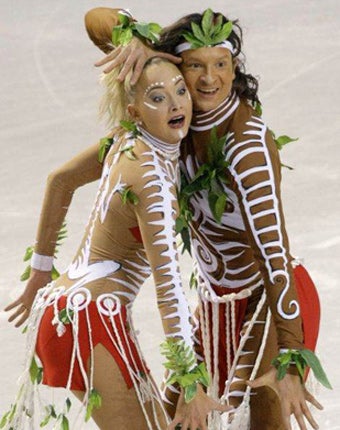Skating on thin ice: Russians' Aboriginal routine fails to amuse

It was certainly an arresting performance: the Russian world figure skating champions, clad in dark-toned bodysuits and red loincloths, performing a routine based on an Aboriginal dance. It won Oksana Domnina and Maxim Shabalin a gold medal at their national competition last month. But in Australia, Aboriginal leaders were not amused.
The Moscow-based pair, who plan to repeat their performance at next month's Winter Olympics in Vancouver have been accused of gross insensitivity and cultural theft.
Sol Bellear, from the New South Wales Aboriginal Land Council, described the dance as "very offensive". "We see it as stealing Aboriginal culture, and it is yet another example of the Aboriginal culture of Australia being exploited."
The Russian routine includes ceremonial dance steps, performed in costumes adorned with eucalyptus leaves and white swirls representing traditional-style body paint. But the designs, according to Bev Manton, chairwoman of the Land Council, are "no more 'authentic'... than the shiploads of cheap 'Aboriginal' tourist trinkets that pour into our country from overseas".
As if offending the custodians of an ancient culture were not bad enough, Domnina, 25, and Shabalin, 27, have also been accused of appropriating the idea from rival Australian skaters, Danielle O'Brien and Greg Merriman.
The Australian pair staged their Aboriginal-themed routine at a competition in Korea in 2008. But, according to the The Age newspaper, that was only "after spending a year in consultation with the indigenous community to ensure their performance, music and costumes respected Aboriginal culture".
So what research did the Russians – world champions last year, European champions in 2008 and three times national champions – conduct? "We've watched video clips on the internet of these dances, and it really is like this, complete with the leaves around the knees," Domnina told the ice skating website Golden Skate.
She said: "We did not want to create another Slavic dance and have considered a lot of options, including Scottish folk. But eventually we settled on this one. I thought it was just crazy, but once we have tried it, we immediately fell in love with it."
The pair, who turned heads when they unveiled their routine at the Russian figure skating championships in St Petersburg, are favourites to win gold in the ice dance competition in Vancouver. Their Australian rivals failed to qualify because of injury.
Ms Manton told The Age: "Aboriginal people, for very good reason, are sensitive about their cultural objects and icons being co-opted by non-Aboriginal people, whether they are from Australia or Russia. It's important for people to tread carefully and respectfully when they are depicting somebody else's culture and I don't think this performance does."
Mr Bellear, who plans to protest to the Russian ambassador in Canberra, said: "It's absolutely been stolen without our permission, and without consultation of the relevant dance groups within Aboriginal Australia. It's not just intellectual property; it's straight-out cultural theft."
The authenticity of the music has also been questioned. Local media say ice skating fans have identified the track as having been composed by Sheila Chandra, a Briton of Indian descent.
The Russians are to perform their Aboriginal dance today at the European championships in Estonia.
Rink-side scandals
* Tonya Harding and Nancy Kerrigan were the great rivals in American women's figure skating in the build-up to the 1994 Winter Olympics. Then Kerrigan was brutally attacked by a thug hired by Harding's ex-husband, injuring her knee. Harding was eventually fined $160,000 for her role in covering up the crime – but retained her place in the Olympic team. She finished eighth; Kerrigan recovered to win silver.
* Double gold medallist Katarina Witt was nearly as well-known for her costumes as her skating: her skirtless feather-trimmed outfit at the 1988 Olympics led the authorities to modify the rules to insist on more modest clothes. Witt won gold anyway, and went on to appear in Playboy.
* When the Canadian pair of Jamie Salé and David Pelletie finished their routine at the 2002 Olympics, most observers were sure that gold was theirs. But to general shock, and outraged headlines in Canada, the judges disagreed, placing a Russian pair first by a whisker. There it might have rested – if a French judge had not allegedly made a tearful confession (later denied) that her score was rigged. The Russians kept their gold – but at least the Canadians got one too.
Archie Bland
Subscribe to Independent Premium to bookmark this article
Want to bookmark your favourite articles and stories to read or reference later? Start your Independent Premium subscription today.

Join our commenting forum
Join thought-provoking conversations, follow other Independent readers and see their replies